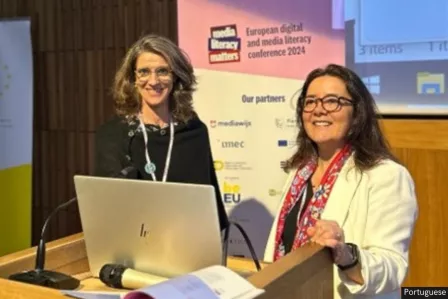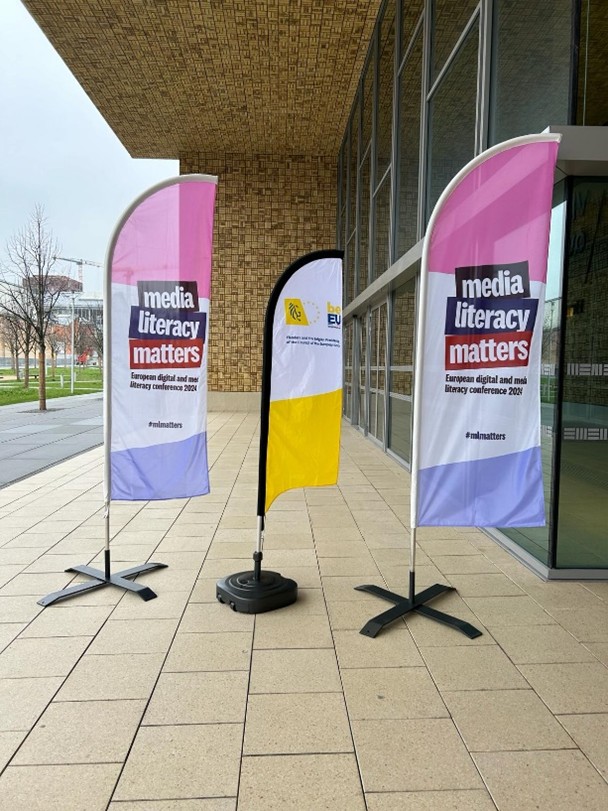Sofia Rasgado (Portuguese Safer Internet Centre) and Fernanda Bonacho (ESCS – School of Communication and Media Studies) presented the Portuguese multistakeholder approach for media literacy at the Media Literacy Matters conference held in Brussels on 29 February 2024.

Founded in 2009 on the joint initiative of its first permanent members, the Informal Group on Media Literacy (GILM), as its name suggests, is an informal network of partners who decided to come together to debate, collaborate and articulate ways of promoting media education and to emphasise the importance of better media literacy levels for all citizens in Portugal. In this sense, they aim to contribute to strengthening public policies.
In the first years of its existence, GILM’s work was driven by the conviction that it was necessary to put the importance of media literacy on the national public agenda. And that’s the direction its activity has taken over the years. In this context, it is important to highlight the “Braga Declaration – Media Literacy”, a document that contributed and contributes to explaining the objectives that have guided GILM’s activity over time. It was ratified in April 2011 by the organisers of the first edition of the Literacy, Media and Citizenship congress, an initiative that the Group considers one of its brand images.
Since 2009, GILM has grown to a total of 14 permanent members, all of which are public institutions, and a guest expert:
- LUSA Agency (news agency)
- National Cybersecurity Centre | Safer Internet Centre (CNCS | CIS)
- Portuguese National Commission for Unesco
- The Portuguese Education Council (CNE)
- Directorate-General for Education
- Portuguese Regulatory Authority for the Media
- School of Communication and Media Studies/IPL – Lisbon Polytechnic
- Institute of Cinema and Audiovisual (ICA)
- Communication Observatory (OberCom)
- National Reading Plan (PNL)
- Radio and Television of Portugal,
- School Library Network
- Presidency of the Council of Ministers General Secretariat
- Association .PT
- Vítor Tomé - Guest Expert in Education for Digital Citizenship.
As the name implies, GILM operates informally, without a formal existence or mandate, and its regular meetings aim at the cooperation of its members to share relevant information, carry out initiatives that may benefit from the synergies of the various participating entities, and promote cross-sectoral collaboration aimed at adjusting to the structural and technological changes faced by the media sector. Due to its model, it is possible to identify benefits and challenges that are present in the daily work of the Group. Nevertheless, its members are always trying to find innovative and smart solutions to overcome them.
| Benefits | Challenges |
|---|---|
| Diversity of experiences and methodologies - Permament Forum | Lack of a hierarchy can make decision-making difficult |
| Synergies in resource management | Settling different positions |
| Development of joint projects (with longevity) | Lack of exclusive resources: - slows down the implementation of projects/initiatives - limits the ability to systematise the work done - difficult to invest in evaluation |
| Streamlining work procedures (based in members focal points) | Group size - regular meetings can be very time-consuming |
| Access to up-to-date information about different interventions areas | |
| Facilitate articulated public intervention and the ability to influence public policy |
Since its foundation, GILM has begun to organise itself to also be an action group capable of promoting initiatives designed to involve all those interested in promoting media education and media literacy, but also to draw the attention of those who have never heard of them. Over the years, GILM has expanded its digital presence across numerous online platforms, from websites and blogs to popular social media channels like Instagram, Facebook, and YouTube. This expansion isn’t just about reaching audiences, but also about fostering meaningful interactions with the public.
Recognising the complexity of the digital landscape, the last year was a turning point: the Group decided to gather online information, which was scattered in various places, into a single and cohesive GILM website. This strategic move was not only for organisational convenience, but as a deliberate effort to enhance information effectiveness. The GILM website intends to be carefully designed taking into consideration the digital evolution, media literacy, and to empower citizens to cultivate a critical thinking approach in the digital age.

Find out more about the work of the Portuguese Safer Internet Centre, including its awareness raising, helpline, hotline and youth participation services – or find similar information for Safer Internet Centres throughout Europe.
Sofia Rasgado (Portuguese Safer Internet Centre) and Fernanda Bonacho (ESCS – School of Communication and Media Studies) presented the Portuguese multistakeholder approach for media literacy at the Media Literacy Matters conference held in Brussels on 29 February 2024.

Founded in 2009 on the joint initiative of its first permanent members, the Informal Group on Media Literacy (GILM), as its name suggests, is an informal network of partners who decided to come together to debate, collaborate and articulate ways of promoting media education and to emphasise the importance of better media literacy levels for all citizens in Portugal. In this sense, they aim to contribute to strengthening public policies.
In the first years of its existence, GILM’s work was driven by the conviction that it was necessary to put the importance of media literacy on the national public agenda. And that’s the direction its activity has taken over the years. In this context, it is important to highlight the “Braga Declaration – Media Literacy”, a document that contributed and contributes to explaining the objectives that have guided GILM’s activity over time. It was ratified in April 2011 by the organisers of the first edition of the Literacy, Media and Citizenship congress, an initiative that the Group considers one of its brand images.
Since 2009, GILM has grown to a total of 14 permanent members, all of which are public institutions, and a guest expert:
- LUSA Agency (news agency)
- National Cybersecurity Centre | Safer Internet Centre (CNCS | CIS)
- Portuguese National Commission for Unesco
- The Portuguese Education Council (CNE)
- Directorate-General for Education
- Portuguese Regulatory Authority for the Media
- School of Communication and Media Studies/IPL – Lisbon Polytechnic
- Institute of Cinema and Audiovisual (ICA)
- Communication Observatory (OberCom)
- National Reading Plan (PNL)
- Radio and Television of Portugal,
- School Library Network
- Presidency of the Council of Ministers General Secretariat
- Association .PT
- Vítor Tomé - Guest Expert in Education for Digital Citizenship.
As the name implies, GILM operates informally, without a formal existence or mandate, and its regular meetings aim at the cooperation of its members to share relevant information, carry out initiatives that may benefit from the synergies of the various participating entities, and promote cross-sectoral collaboration aimed at adjusting to the structural and technological changes faced by the media sector. Due to its model, it is possible to identify benefits and challenges that are present in the daily work of the Group. Nevertheless, its members are always trying to find innovative and smart solutions to overcome them.
| Benefits | Challenges |
|---|---|
| Diversity of experiences and methodologies - Permament Forum | Lack of a hierarchy can make decision-making difficult |
| Synergies in resource management | Settling different positions |
| Development of joint projects (with longevity) | Lack of exclusive resources: - slows down the implementation of projects/initiatives - limits the ability to systematise the work done - difficult to invest in evaluation |
| Streamlining work procedures (based in members focal points) | Group size - regular meetings can be very time-consuming |
| Access to up-to-date information about different interventions areas | |
| Facilitate articulated public intervention and the ability to influence public policy |
Since its foundation, GILM has begun to organise itself to also be an action group capable of promoting initiatives designed to involve all those interested in promoting media education and media literacy, but also to draw the attention of those who have never heard of them. Over the years, GILM has expanded its digital presence across numerous online platforms, from websites and blogs to popular social media channels like Instagram, Facebook, and YouTube. This expansion isn’t just about reaching audiences, but also about fostering meaningful interactions with the public.
Recognising the complexity of the digital landscape, the last year was a turning point: the Group decided to gather online information, which was scattered in various places, into a single and cohesive GILM website. This strategic move was not only for organisational convenience, but as a deliberate effort to enhance information effectiveness. The GILM website intends to be carefully designed taking into consideration the digital evolution, media literacy, and to empower citizens to cultivate a critical thinking approach in the digital age.

Find out more about the work of the Portuguese Safer Internet Centre, including its awareness raising, helpline, hotline and youth participation services – or find similar information for Safer Internet Centres throughout Europe.
- media literacy digital citizenship
Related content
- < Previous article
- Next article >











